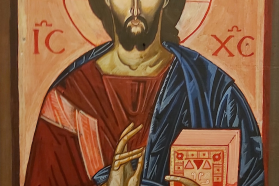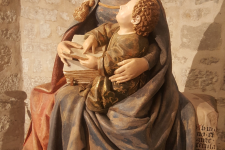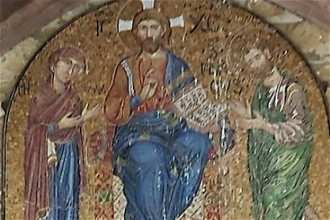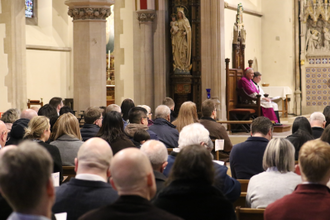Sunday Reflection with Canon Robin Gibbons - 18th July 2021
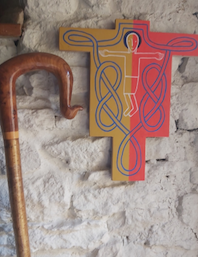
Image: Canon Robin Gibbons
16th Sunday in Ordinary Time
I will not comment much about Pope Francis motu proprio 'Traditiones custodes' , it is far too early, but I wish to use these words from the Pope to the Bishops in his letter of explanation as wise counsel for helping us with our scriptural reflections: 'I address you with confidence and parrhesia, in the name of that shared "concern for the whole Church, which contributes greatly to the development of the universal Church"'.
To my mind, the words of the Prophet Jeremiah about 'false shepherds' apply not to the Pope but to us, who are also tasked with shepherding for Christ. In the plethora of heated remarks about what Pope Francis has written, there are some extremely emotive and dare I say irresponsible comments, yes some people 'feel' upset, let down , but I doubt they have taken the trouble to read, discern, think, pray and only then after reflection, comment on the enormous issues he has raised. Our society loves shooting from the hip, but that is not the Christian tradition. Fortunately some saner voices remind us that in our scriptural tradition, the shepherd of the Lord's flock has to act decisively when the occasion demands. So, in a rather wonderful image the Pope uses in that opening sentence two very important words, 'confidence' and 'parrhesia'. Confidence we know but parrhesia?
Herein lies the illumination we seek, translated into English it means 'free speech' but also 'plain speaking' in terms of truth. Michel Foucault speaking in a series of lectures about this word puts it thus:
'In parrhesia, the speaker is supposed to give a complete and exact account of what he has in mind so that the audience is able to comprehend exactly what the speaker thinks'.
Effectively it is the honest opening of heart and mind in shared discourse, it is as Foucault points out 'dangerous' mainly because people cannot bear too much truth, and so in terms of that idea of shepherd which Francis always leads us back to, he understands his task (as also others including ourselves) is to become someone 'who has the moral qualities which are required, first, to know the truth, and secondly, to convey such truth to others'. It is dangerous to put ones finger on a problem, great courage is required to act upon it, the one who speaks parrhesia is not the tyrant, teacher, disciplinarian, pope, but one who sees a larger, more evident problem.
Not only does this form of shepherding involve risk, it has that dimension common to the prophetic charism of our community and the call to be good shepherds, that of really knowing the flock, so that we can learn to discern a situation and lead away from it in some manner. Foucault again: 'the function of parrhesia is not to demonstrate the truth to someone else, but has the function of criticism: criticism of the interlocutor or of the speaker himself. "This is what you do and this is what you think; but this is what you should not do and should not think." "This is the way you behave, but that is the way you ought to behave." "This is what I have done, and was wrong in so doing." Parrhesia is a form of criticism, either towards another or towards oneself'
That I think is part of what Jesus himself is calling us to look at with confidence as the Letter to the Ephesians tells us ;' Brothers and sisters:
In Christ Jesus you who once were far off
have become near by the blood of Christ.'(Eph 2:13).
But it is more than that, just as we need to take Climate Change and all its consequences very seriously, so too we need to take the Spirit's call to the Church throughout the world seriously too. If those of us who have lived through Covid Lockdown can learn anything from it, it is that our faith can exist with very little props if need be, but that the one true Shepherd always has us in mind, for those who want to engage, the call is clear, it is that call in Lent, 'Repent and believe the Gospel' but it is also two other things as well.
Firstly to let go and listen, stop that noise we make and really listen to what we are being asked to do, 'He ( Jesus) said to them, "Come away by yourselves to a deserted place and rest a while.' (Mk 6:31a) The second is what Francis means by parrhesia, a self reflection that is also an honest listening to critique. Listen then to to Jeremiah's words: and apply them to oneself;
'Woe to the shepherds who destroy and scatter the flock of my pasture-oracle of the LORD. Therefore, thus says the LORD, the God of Israel, against the shepherds who shepherd my people: You have scattered my sheep and driven them away. You have not cared for them, but I will take care to punish your evil deeds (Jer 23:1-2).
Then and only then, when we are adult enough to take on our responsibility, examine our wavering consciences, when we stop complaining, moaning and grousing to rediscover ourselves as part of a family, we can turn again like Christ to this: "When he disembarked and saw the vast crowd, his heart was moved with pity for them, for they were like sheep without a shepherd; and he began to teach them many things'.(Mk 6:34) That is the confidence we seek, to be moved with pity and love for others but to be very aware too that we live in the here and now.
The Good Shepherd
by Stanley Moss
Because he would not abandon the flock for a lost sheep
after the others had bedded down for the night,
he turned back, searched the thickets and gullies.
Sleepless, while the flock dozed in the morning mist
he searched the pastures up ahead. Winter nearing,
our wool heavy with brambles, ropes of muddy ice,
he did not abandon the lost sheep, even when the snows came.
Still, I knew there was only a thin line
between the good shepherd and the butcher.
How many lambs had put their heads between the shepherd's knees,
closed their eyes, offering their neck to the knife?
Familiar - the quick thuds of the club doing its work.
More than once at night I saw the halo coming.
I ran like a deer and hid among rocks,
or I crawled under a bush, my heart in thorns.
During the day I lived my life in clover
watching out for the halo.
I swore on the day the good shepherd catches hold,
trying to wrestle me to the ground and bind my feet,
I will buck like a ram and bite like a wolf,
although I taste the famous blood
I will break loose! I will race under the gates of heaven,
back to the mortal fields, my flock, my stubbled grass and mud.
Comment on the poem by Carol Rumens ( The Guardian 19 Dec 2016)
… The problem the poem discerns is one at the heart of the great religions. Their conventional message, even when the preacher is as radical and refreshing as Christ, always promotes the same ultimate goal, insisting that the true life is not of this world. The Christian God miraculously becomes incarnate at Christmas, and shares our mortality, but the intention still is to lead us to that other, immortal life. Heaven's unimaginable perfection and stasis are the true creation.
The sheep in The Good Shepherd takes the pragmatic view. Heaven is here on earth. It can be harsh, stubbly and muddy, brambly and icy as well as clover-sweet, but it's what we have. Haloes are dangerous when they tell us otherwise.
From Michel Foucault
'…parrhesia is a kind of verbal activity where the speaker has a specific relation to truth through frankness, a certain relationship to his own life through danger, a certain type of relation to himself or other people through criticism (self-criticism or criticism of other people), and a specific relation to moral law through freedom and duty. More precisely, parrhesia is a verbal activity in which a speaker expresses his personal relationship to truth, and risks his life because he recognizes truth-telling as a duty to improve or help other people (as well as himself). In parrhesia, the speaker uses his freedom and chooses frankness instead of persuasion, truth instead of falsehood or silence, the risk of death instead of life and security, criticism instead of flattery, and moral duty instead of self-interest and moral apathy'.



